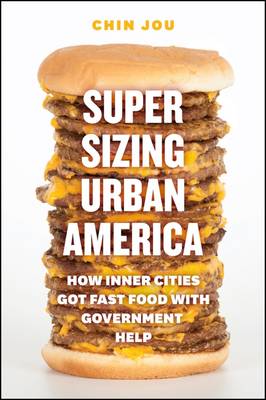19%OFF
Stock image for illustration purposes only - book cover, edition or condition may vary.
Supersizing Urban America: How Inner Cities Got Fast Food with Government Help
Chin Jou
FREE Delivery in Ireland
Description for Supersizing Urban America: How Inner Cities Got Fast Food with Government Help
Hardcover. Num Pages: 248 pages, 2 tables. BIC Classification: 1KBB; HBJK; HBLW. Category: (G) General (US: Trade). Dimension: 228 x 152. .
More than one third of adults in the United States are obese. The CDC estimates that there are over 112,000 obesity-related deaths annually, and for years now, the government has waged a very public war on the problem. Former Surgeon General Richard Carmona warned in 2006 that obesity is the terror within, going so far as to call it a threat that will dwarf 9/11. Health care reform, prevention and wellness grants, information requirements for menus, Michelle Obama's Let's Move campaign it seems like every year brings a new initiative attempting to stem the ... Read moretide of obesity in the United States. What doesn't get mentioned in all this? The fact that the federal government helped create the obesity crisis in the first place especially in one place where it is acute, among urban African American communities. With Supersizing Urban America, Chin Jou tells that little-known story of how the US government got into the business of encouraging fast food in inner cities, with unforeseen consequences we're only beginning to understand. Jou begins her story in the late 1960s, when predominantly African-American neighborhoods went from having no fast food chain restaurants to being littered with them. She uncovers the federal policies that have helped to subsidize that expansion, including loan guarantees to fast food franchisees, programs intended to promote minority entrepreneurship, and urban revitalization initiatives. On top of all that, fast food companies began to relentlessly market to urban African American consumers. An unintended consequence of these developments was that low-income, minority communities became disproportionately affected by the obesity epidemic. ?In the first book about the US government's problematic role in promoting fast food in inner-city America, Jou tells a riveting story of the food industry, obesity, and race relations in America that is essential to understanding health and obesity in contemporary urban America. Show Less
Product Details
Publisher
University Of Chicago Press
Place of Publication
, United States
Shipping Time
Usually ships in 7 to 11 working days
About Chin Jou
Chin Jou is a lecturer in American history at the University of Sydney.
Reviews for Supersizing Urban America: How Inner Cities Got Fast Food with Government Help
Chronicles how policies put in place by the federal government actually made it easier for minorities to open fast-food franchises in their neighborhoods than grocery stores. Today the landscape of urban America reflects this history. There's a fast-food restaurant within walking distance in many low-income neighborhoods, but nary a green leafy vegetable in sight....As Jou's book argues, there's too little ... Read moremoney to be made from groceries and too much risk for business owners in impoverished areas compared with opening an already proven franchise.
NPR 'The Salt' Should be required reading for anyone seeking to understand the links between government policy, fast food franchising and the economic and biological health of urban communities. It's a book that should make us rethink not only the way we eat but the foundations of American capitalism.
Times Higher Education Fascinating....A critically important historical analysis of fast food.
Pacific Standard Jou's book shows conclusively that obesity and diet in America have little to do with personal responsibility, and everything to do with public policy.
New Republic This page-turner of a book tells a virtually unknown story. Federal policies to assist small businesses deliberately introduced fast-food outlets into low-income minority areas to the benefit of franchise owners while promoting widespread obesity in these communities. For anyone interested in the role of government policy in food, health, and race relations, Supersizing Urban America is a must-read.
Marion Nestle, author of Soda Politics: Taking On Big Soda (and Winning) Supersizing Urban America digs into how the federal government helped fast food franchises expand into cities by backing small business loans in the late 1960s.
CityLab Rare is a work like Chin Jou's Supersizing Urban America, which explores a facet of food
one that has serious health consequences
in a potentially new and intriguing way by linking local food environments to a relatively obscure federal program.
Journal of Agriculture, Food Systems, and Community Development Supersizing Urban America is an historical docu-drama with a hint of film noir's dark morality. Like a good cinema visit, it leaves you wondering how to process what you have learned. Readers will never quite look at the ubiquitous fast food franchise in the same way again. In addition to an appealing writing style Jou's deft use of statistics throughout the book help compare and contrast the historical and current urban experience. Her work is important for anyone interested in health, social, business and food histories.
Food, Culture & Society Supersizing Urban America details how the U.S. government has helped subsidize the growth of fast-food outlets in minority communities through Small Business Administration grants, as well as urban revitalization and minority entrepreneurship initiatives that prioritize fast-food establishments over other industries. It won't be easy to reverse this trend, especially as the industry increasingly looks to Latino neighborhoods and other minority communities to boost sales. But Jou said there's hope.
Huffington Post Show Less


